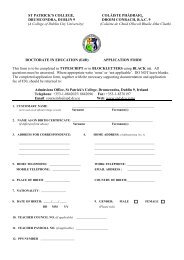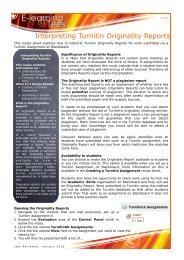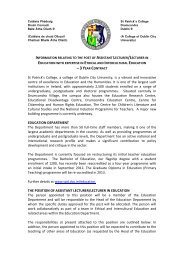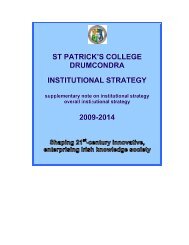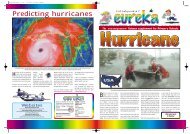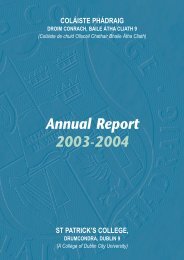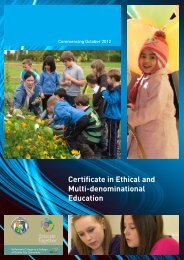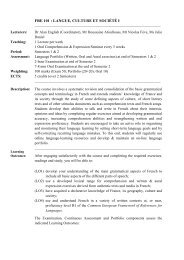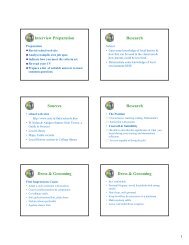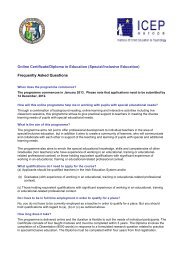Information and Instruction for outgoing Students 1. Objectives of ...
Information and Instruction for outgoing Students 1. Objectives of ...
Information and Instruction for outgoing Students 1. Objectives of ...
You also want an ePaper? Increase the reach of your titles
YUMPU automatically turns print PDFs into web optimized ePapers that Google loves.
<strong>In<strong>for</strong>mation</strong> <strong>and</strong> <strong>Instruction</strong> <strong>for</strong> <strong>outgoing</strong> <strong>Students</strong><br />
<strong>1.</strong> <strong>Objectives</strong> <strong>of</strong> ERASMUS International Study visit:<br />
The aims <strong>of</strong> your visit to the partner institution are:<br />
· TO CONTINUE YOUR STUDIES IN YOUR TWO DEGREE SUBJECTS<br />
· TO EXPERIENCE LIFE AND WORK IN A FOREIGN COLLEGE AND COUNTRY CONTINUOUSLY (WITHOUT<br />
BREAKS) FOR THREE MONTHS<br />
· TO LEARN ABOUT THE HISTORY AND CULTURE OF THE HOST COUNTRY<br />
· TO IMPROVE YOUR KNOWLEDGE OF THE NATIONAL LANGUAGE OF THE HOST COUNTRY<br />
2. Communication with College<br />
You will tend to <strong>for</strong>get SPD <strong>and</strong> Irel<strong>and</strong> while abroad, but you MUST stay in contact with<br />
College during your Erasmus/International visit. The following are a list <strong>of</strong> the Heads <strong>of</strong><br />
Departments. You will agree your study programme with the Head <strong>of</strong> each subject areas.<br />
Should you encounter a problem with a course that you had chosen to take abroad this must<br />
be communicated to the Head <strong>of</strong> the Department immediately so that alternative arrangements<br />
can be agreed i.e<br />
· When you arrive in your host university your selected <strong>and</strong> agreed course is not<br />
running, This must be communicated in the first week <strong>of</strong> your arrival.<br />
Education: Dr. Mark Morgan<br />
Gaeilge: Dr. Mairin Nic Eoin<br />
English: Dr. Brenna Clarke<br />
French: Dr. Alan English<br />
History: Dr. Mary Ann Lyons<br />
Music: Dr. Marion Doherty<br />
Geography: Dr. Gerry O’Reilly<br />
Maths: Dr. Maurice O’ Reilly<br />
Religion: Dr. Raymond Topley<br />
Human Development: Dr Joseph Dunne<br />
3. ERASMUS/INTERNATIONAL PERSONNEL AT YOUR HOST COLLEGE<br />
Host college Erasmus/International Coordinator<br />
The host college has an Erasmus/International Coordinator <strong>and</strong> Erasmus/International Office.<br />
Do not hesitate to use their services, to seek advice <strong>and</strong> assistance on all practical aspects <strong>of</strong><br />
your stay at that college, or any matter.<br />
Host college Academic tutor<br />
The Erasmus coordinator will tell you who your academic tutor is, that is who will advise you on<br />
your courses at the host college, assessment <strong>of</strong> work done as part <strong>of</strong> courses, grades,<br />
certificates/transcript <strong>of</strong> records, language courses etc. Make sure you find out who that person<br />
is if possible be<strong>for</strong>e your departure.<br />
4. Study Programme <strong>and</strong> Learning Agreement<br />
Your entire study programme <strong>for</strong> the semester <strong>of</strong> your Erasmus/ International study visit must<br />
be approved by the appropriate lecturers in your two academic departments at St Patrick's<br />
College. For example, if you intend taking a course on Sociology at the host college, it must be<br />
approved by the Education Department <strong>and</strong> in particular by the relevant lecturer in<br />
Sociology. The same applies <strong>for</strong> all academic subjects.
Agreement must be documented <strong>and</strong> signed by the student <strong>and</strong> co signed by the Head <strong>of</strong> the<br />
Department. This <strong>for</strong>m must be stamped in the International Office in the host institution <strong>and</strong><br />
returned to us.<br />
Should you make agreed amendments to this <strong>for</strong>m, Page 2 should be completed to reflect<br />
these changes signed <strong>and</strong> returned to the Interantional Office, St Patrick’s College.<br />
5. Teaching Practice<br />
Secondyear students now receive one third <strong>of</strong> their marks <strong>for</strong> Second <strong>and</strong> Third year TP in the<br />
second year. For the moment secondyear TP must be undertaken in Irel<strong>and</strong>. This means<br />
secondyear Erasmus students miss Spring TP <strong>and</strong> must make up <strong>for</strong> this later in the year. It<br />
should be noted that so far this arrangement has worked very well.<br />
It is strongly recommended that B.Ed. Erasmus students avail <strong>of</strong> TP while in the host college.<br />
They should arrange their TP be<strong>for</strong>e arrival or as soon as possible afterwards. This will be<br />
necessary particularly if TP takes place in your host college on a one or twodays a week basis<br />
which is better <strong>for</strong> ERASMUS students. <strong>Students</strong> going to University <strong>of</strong> Northern Colorado <strong>and</strong><br />
Cali<strong>for</strong>nia State University, Chico will undertake a Teaching Practice while away <strong>and</strong> this will be<br />
supervised <strong>and</strong> graded in each <strong>of</strong> those Universities.<br />
6. Practical Issues<br />
Passport<br />
Your passport is a very important <strong>and</strong> valuable document. Always bring your passport when<br />
crossing national boundaries. But do not carry it round in the host country. Keep it in a safe<br />
place.<br />
Security<br />
Take care not to have a mishap while abroad. Be mindful <strong>of</strong> personal security at all times.<br />
You can take precautions by using public transport or taxis at night, thinking about where you<br />
are going <strong>and</strong> avoiding places which might be present danger. Take care not to attract the<br />
attention <strong>of</strong> bagsnatchers, muggers etc. in large cities where tourists <strong>and</strong> visitors can be easily<br />
identified.<br />
Your security, health, <strong>and</strong> safety are your responsibility. Make a rule to avoid while abroad any<br />
substance that may adversely affect your judgement <strong>and</strong> per<strong>for</strong>mance socially <strong>and</strong><br />
academically.<br />
Have addresses, tel./ fax numbers, email addresses <strong>of</strong> the Irish embassy or consulates in your<br />
host country.<br />
7. Medical Care<br />
Health insurance U.S.A.<br />
You must obtain Travel insurance be<strong>for</strong>e you travel to the U.S.A covering Baggage, Medical,<br />
repatrication in the event <strong>of</strong> an accident <strong>and</strong> it is also advisable to include Adventure Sports. Do not<br />
leave without it as medical expenses are very costly in the States.
Getting necessary healthcare in other EU / EEA countries<br />
As an Irish resident you are entitled to get healthcare through the public system in countries <strong>of</strong> the<br />
European Union (EU), European Economic Area (EEA) or Switzerl<strong>and</strong> if you become ill or injured<br />
while on a temporary stay there.<br />
Until now, you needed an E <strong>for</strong>m – such as the E111 or the E128 to get such treatment. Now, these<br />
paper <strong>for</strong>ms are being replaced by the European Health Insurance Card. One Card is needed <strong>for</strong> each<br />
individual or member <strong>of</strong> the family.<br />
The Card was introduced on 1 June 2004. It means that you can get necessary healthcare<br />
in the public system <strong>of</strong> any EU / EEA country or Switzerl<strong>and</strong>, if you become ill or injured<br />
while on a temporary stay in that country.<br />
Apply <strong>for</strong> the European Health Insurance Card if you:<br />
· Plan to go on holiday to another EU / EEA country or Switzerl<strong>and</strong><br />
· Regularly visit any <strong>of</strong> these countries, <strong>for</strong> example, on business, as a transport worker or <strong>for</strong><br />
leisure<br />
· Plan to go to any <strong>of</strong> these countries to seek work<br />
· Are being sent by your employer to work in any <strong>of</strong> these countries temporarily but will continue<br />
to pay tax in Irel<strong>and</strong><br />
· Intend to undertake a course <strong>of</strong> study in any <strong>of</strong> these countries but still consider yourself as<br />
ordinarily resident in Irel<strong>and</strong><br />
· Intend to visit any <strong>of</strong> these countries <strong>for</strong> any other type <strong>of</strong> temporary stay where healthcare<br />
in itself is not the aim <strong>of</strong> the visit<br />
Travelling to Great Britain or Northern Irel<strong>and</strong><br />
You don’t need a European Health Insurance Card to get necessary healthcare while on a temporary<br />
visit to the UK. It is enough to show pro<strong>of</strong> that you are ordinarily resident in Irel<strong>and</strong> – in practice, this<br />
means a driving licence, passport or similar document.<br />
Apply <strong>for</strong> or Renew your EHIC Going to Europe Do not leave without it<br />
Click to apply online EHIC<br />
If your card needs renewal please Click Renew EHIC<br />
EU member states<br />
Austria, Belgium, Cyprus, Czech Republic, Denmark, Estonia, Finl<strong>and</strong>, France,<br />
Germany, Greece, Hungary, Italy, Latvia, Lithuania,<br />
Luxembourg, Malta, Netherl<strong>and</strong>s, Pol<strong>and</strong>, Portugal, Romania, Slovakia, Slovenia,<br />
Spain, Sweden,<br />
UK (the Card is not essential <strong>for</strong> access to necessary healthcare in the UK – pro<strong>of</strong> <strong>of</strong><br />
residency in Irel<strong>and</strong> is sufficient)<br />
Other EEA member states<br />
Icel<strong>and</strong>, Liechtenstein, Norway, Other states, Switzerl<strong>and</strong>
8. Money<br />
Your Erasmus grant will be sent to your home be<strong>for</strong>e your departure, along with a Receipt <strong>of</strong><br />
Grant Form, Financial Agreement, <strong>and</strong> Report Questionnaire. Please sign the Receipt <strong>of</strong> Grant<br />
Form as soon as possible <strong>and</strong> return it to the International Affairs Committee.<br />
Bring at least 100 Euro in the currency <strong>of</strong> the host country.<br />
It's easy to make a distressing mistake in a new currency, especially at the beginning <strong>of</strong> your<br />
stay. Study the currency be<strong>for</strong>e your departure.<br />
Check the rate <strong>of</strong> your host country currency against the Euro, you can do this on<br />
Currency Check<br />
Withdrawing money from your Irish current account while abroad is very expensive: Irish<br />
banks take 3 Euro or more each time cash is withdrawn, whether from an ATM or in a bank.<br />
This means that if you withdraw as little as 10 Euro from your Irish current account in the<br />
currency <strong>of</strong> the host country, you will pay a charge to the Irish bank.<br />
To avoid this you might open a bank account in the host country; the ERASMUS Coordinator at<br />
the host college will assist you, if necessary. Once the account is set up, have someone at<br />
home transfer enough Irish money <strong>for</strong> your entire stay.<br />
Another possibility would be to lodge money in a credit card (VISA etc.) account <strong>and</strong> keep that<br />
account in the BLACK. You can withdraw from ATMs or at banks anywhere you wish without<br />
any charge, as long as you do not go into the RED. You can also make purchases without<br />
having to pay interest. Your contact person in your hpost institution will be able to advice you<br />
on this, perhaps it may be better to open a bank account in your host country.<br />
9. Arrival in the host country<br />
Hopefully someone from the host college will meet you on arrival at the airport or station. If<br />
not, get yourself <strong>and</strong> your luggage to your address as conveniently <strong>and</strong> efficiently as possible.<br />
A taxi would be best. However, if you haven't too much luggage, you could save money by<br />
taking an airport bus to the city centre <strong>and</strong> then using a taxi <strong>for</strong> the remaining shorter distance<br />
to your address.<br />
In most countries you need to take care be<strong>for</strong>e you get into a taxi to get a clear indication from<br />
the driver as to how much the journey will cost even if you're only going a few blocks. There<br />
is very little you can do if you are grossly overcharged. There<strong>for</strong>e avoid having your local<br />
currency reserve dwindle significantly on your first purchase in the host country.<br />
10. Travelling<br />
The name on your passport should appear on your flighttickets, otherwise you will not be<br />
checked in at airports <strong>and</strong> will not be allowed to travel.<br />
When flying, bring important items (passport, tickets, money etc.) as h<strong>and</strong> luggage, just in<br />
case your bags do not arrive with you <strong>and</strong> you are delayed <strong>for</strong> a day or two. Having bags<br />
stolen or taken by mistake at airports or stations is very distressing. Do not leave them even<br />
<strong>for</strong> a second.<br />
Buying goods on flights can put a serious dent in your cash reserve.<br />
Do not carry goods across frontiers <strong>for</strong> strangers.<br />
Hunger slows you down, mentally <strong>and</strong> physically. If you don't get a meal during the flight this<br />
happens quite a lot now have a snack at the airport on arrival, be<strong>for</strong>e moving on to your<br />
destination. At airports <strong>and</strong> main stations there are <strong>In<strong>for</strong>mation</strong> counters. A few minutes
getting clear advice about connections, trains, buses, <strong>and</strong> directions or getting maps will be<br />
well spent.<br />
1<strong>1.</strong> Bus traintickets<br />
When travelling by bus or train, even <strong>for</strong> a small journey in the city, make sure you have a<br />
ticket, properly stamped, punched or whatever. If you risk it you may find that that is the very<br />
time checkers come on board <strong>and</strong> ask you <strong>for</strong> your ticket. Not having a ticket is a serious<br />
<strong>of</strong>fence <strong>and</strong> an expensive one which can cause needless distress. It is also an opportunity<br />
<strong>for</strong> fraudulent checkers to dem<strong>and</strong> more than the normal spot fine, give you no receipt, or take<br />
your passport (which you should not carry round). Usually bus <strong>and</strong> underground traintickets<br />
can be bought at newspaper/cigarette kiosks, at airports etc. Find out about day, weektickets.<br />
12. The host country's language <strong>and</strong> culture<br />
They may not always show it but people like visitors to their country to make an ef<strong>for</strong>t to use<br />
their language, even in small ways greetings, expressions <strong>of</strong> thanks, good wishes etc. Using<br />
their language is a sign <strong>of</strong> respect <strong>for</strong> their culture. Taking <strong>for</strong> granted that everyone in the<br />
host country will know <strong>and</strong> use English can be <strong>of</strong>fensive.<br />
13. Language course<br />
If the host college <strong>of</strong>fers a course in the national language take it. If not, see if courses are run<br />
in the town or city <strong>and</strong> take every opportunity to learn about the culture <strong>of</strong> the country. You<br />
may never get as good a chance to learn about life in another country.<br />
People in the host country who are only interested in practising their English with you should<br />
be avoided.<br />
14. Galleries etc.<br />
Make sure you get to see the cultural highlights <strong>of</strong> the host city <strong>and</strong> country, e.g. galleries,<br />
museums, historical l<strong>and</strong>marks, the capital city etc. With three months at your disposal you<br />
should be able to do this.<br />
15. Food<br />
Be prepared <strong>for</strong> differences in food. Dishes in the host country may tend to be lighter or<br />
heavier, sweeter or saltier, more bl<strong>and</strong>, fishier, spicier, fatter, larger in size, smaller etc., etc.<br />
Courtesy <strong>and</strong> discretion are absolute musts in this regard.<br />
15. Punctuality<br />
Be punctual <strong>for</strong> classes, appointments, invitations etc., even if punctuality seems not to be a<br />
priority in the culture <strong>of</strong> your particular host country.<br />
17. About Irel<strong>and</strong><br />
Being overseas gives you an opportunity to think about your own country, its culture, its<br />
history, its strengths, its problems etc. Comparisons with the host country are inevitable.<br />
Thinking about these things be<strong>for</strong>e you travel will be helpful, because people in the host<br />
country will be quite curious about Irel<strong>and</strong> <strong>and</strong> will ask questions.<br />
They know already about Guinness, The Corrs, U2, the Celtic Tiger etc. They will want to know<br />
about other aspects <strong>of</strong> our country: politics (party differences, Northern Irel<strong>and</strong>), history,
Gaelic games, the Irish language, Irish music, the school system, food, the regions outside<br />
Dublin etc.<br />
A travel guide or general pictorial guide to Irel<strong>and</strong> might be very helpful when you are talking<br />
about Irel<strong>and</strong>.<br />
18. Tokens, gifts<br />
You can save money be<strong>for</strong>e your departure by getting a supply <strong>of</strong> inexpensive items which are<br />
typically Irish. They will come in h<strong>and</strong>y as a talking point <strong>and</strong> a token <strong>of</strong> gratitude when<br />
someone does you a favour, invites you to dinner, brings you on a tour etc.<br />
19. Books on your host country, Web sites etc.<br />
A book such as The Rough Guide to... or The Lonely Planet Guide to ... will be invaluable when<br />
you arrive in the host country <strong>for</strong> finding out about all aspects <strong>of</strong> the country, its history,<br />
availability <strong>of</strong> accommodation in towns <strong>and</strong> cities etc.<br />
There will also be lots <strong>of</strong> web sites with in<strong>for</strong>mation on your host country.<br />
<strong>Students</strong> going to the U.S.A<br />
Student going on International exchange to the U.S.A. must obtain a visa to study there.<br />
You will receive all <strong>of</strong> the necessary documentation from your host institution together with<br />
your passport <strong>and</strong> supporting letter from St Patrick’s College which you will be able to take to<br />
the U.S Embassy in Ballsbridge in Dublin from where your passport should issue within 1 week.<br />
There is currently a charge <strong>of</strong> Euro 100 <strong>for</strong> this.<br />
Please visit the Student visa in<strong>for</strong>mation webpages <strong>of</strong> the US Embassy website<br />
Click Student Visa<br />
Returning back to St Patrick’s College<br />
Your host Institution will return a Transcript <strong>of</strong> Records <strong>for</strong> grades awarded. This will be used<br />
in the exam system whereby grades will transfer <strong>for</strong> courses you have taken while abroad.<br />
B.Ed <strong>Students</strong> Teaching Practice missed while abroad will be done in September in Dublin,<br />
please liaise with the Teaching Practice Office about same.<br />
Your exchange visit should be a very enriching experience, living in a new country, new<br />
culture, meeting <strong>and</strong> making friends, travel etc. Make the best <strong>of</strong> it academically,<br />
socially <strong>and</strong> culturally.<br />
Best <strong>of</strong> luck





